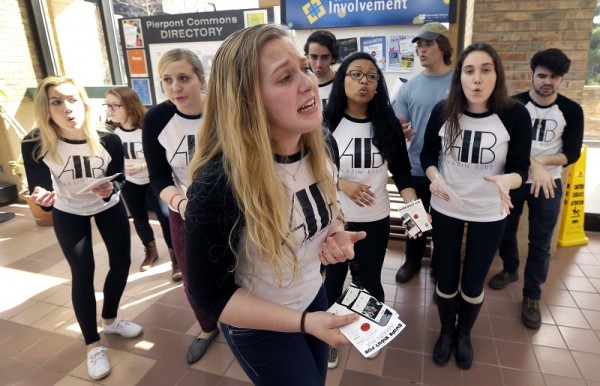College a cappella singers become unlikely stars on campuses

In a photo from Friday, April 10, 2015, Abby Drumright sings with The Amazin’ Blue, a A Cappella group, during a practice session at Pierpont commons in Ann Arbor, Mich. AP
PHILADELPHIA—Their musical performances pack university auditoriums, though they play no instruments.
While universities have long nurtured the niche community of a cappella singers, the TV show “Glee” and hit movie “Pitch Perfect” helped create a new generation of fans that propelled the soulful, unaccompanied vocal sound into mainstream culture. Now, they’re unlikely stars on campuses across the U.S.
On Saturday, about 3,000 people will flock to New York to see eight groups compete in the collegiate championship of a cappella singings. The sold-out show at the Beacon Theatre is a far cry from the paltry crowd of 200 that watched the national finals more than a decade ago.
“Now the larger world is seeing that it’s awesome,” said Amanda Newman, executive director of Varsity Vocals, the event’s organizer. “Everyone’s just over the moon. It wasn’t a secret that we wanted to keep.”
This isn’t your grandfather’s barbershop quartet. Covering pop songs like Beyonce’s “Crazy in Love” and Hozier’s “Take Me to Church,” the groups earn the adulation of cheering fans through their complex harmonies and choreography.
“People used to think of vocal music as boring choir stuff,” said Isaac Hecker, a member of Amazin’ Blue at the University of Michigan. “Once you figured out that you can do crazy beat-boxing, awesome bass lines (and) throw everything together, you just have really cool music.”
This weekend’s contest is the 19th International Championship of Collegiate A cappella, or ICCA. In its early years, Newman said, only 35 groups competed in the rounds leading up to the finals. This year, about 320 groups in the U.S. and Britain vied for a spot.
The SoCal VoCals of the University of Southern California made the cut after out-singing their regional competition. They practice for hours every week “because we all really want it,” junior Malia Civetz said.
“It is very difficult and we all know that, so when we nail it, it’s just this incredible feeling,” Civetz said.
Though Civetz is a popular music major, many students who sing are pursuing studies completely unrelated to the arts — which is why they make the most of their brief time in the spotlight.
“This is their first and last big chance to be a pop star,” Newman said. “And they are when they’re on their campus, they are when they’re on our stage.”
The a cappella craze showcases a tradition that dates back decades — or longer — at some schools: The Yale Whiffenpoofs were founded in 1909.
Off the Beat started more than 25 years ago at the University of Pennsylvania with audiences of fewer than 100 people, said junior Jasmine Barksdale, the music director. Now the 15-member group performs in an auditorium that can hold about 1,000, she said.
“There are people I meet randomly who are like: ‘Oh my gosh, you’re in Off the Beat? I’ve been to every Off the Beat show since I was a freshman,'” said Barksdale, an economics major at Wharton.
The success of “Pitch Perfect,” based on a book about the small but robust a cappella community, has led to the planned May 15 release of “Pitch Perfect 2.” Two days before that, the Pop cable network debuts “Sing It On,” a documentary-style series on this year’s ICCA competition. Grammy winner John Legend — a former a cappella singer at Penn — is the executive producer.